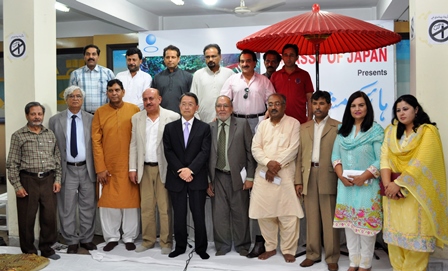EMBASSY OF JAPAN IN PAKISTAN
|
JAPAN EMBASSY ORGANIZED HAIKU RECITAL AT THE PAKISTAN ACEDEMY OF LETTERS ISLAMABAD |
Islamabad: 18th May 2016 PRESS RELEASE N0: JPNEMPAK 16-19 |
The Embassy of Japan in cooperation with the Pakistan Haiku Society besides holding haiku recital has been organizing Urdu haiku training workshops in the educational institutions of the capital for young budding students to learn the art of Urdu haiku poetry. The young students who have been participating in the training workshop were also given opportunity to recite their Haiku on this occasion. Mr. Takashi Kurai, Ambassador of Japan to Pakistan, while speaking on the occasion said haiku is like a snapshot of only one scene of nature or just one aspect of our life; so it is very short, small and simple. While elaborating Ambassador Kurai said however haiku provides the readers much more than what is expressed by words as it gives us an image of particular view of the nature, sound of the flow of river, or even smell of the green after rain fall and so on. The Ambassador said haiku poetry was originally developed in Japan and by Japanese poets, but the form was adapted to English and other languages by poets nearly all over the world including Pakistan. He hoped that haiku will be further accepted and developed in its own way in Pakistan, because Pakistan has incredibly profound culture of poetry, which is very much welcome. Haiku is a form of Japanese poetry that dates back to the 17th century. Haiku is the most precise, compact and condensed poetry originating in Japan. Haiku is defined as an unrhymed verse, written in 5-7-5 syllabic form, usually in three lines. Its subjects are predominantly nature and life experiences. Yosa Buson (1716-¬1783), Matsuo Basho (1644-¬1694) and Kobayashi Issa are among the most popular haiku masters. They are collectively known as the Three Pillars of Haiku, who lived during Japan's Edo-period (1600-1868). Haiku, one of the most important forms of traditional Japanese poetry, still remains popular in modern Japan, and in recent years its popularity has also spread to many countries including Pakistan. Many poets in Pakistan today practice this compact yet profound and evocative form of expression that leaves a lot of room for interpretation and subtlety. (End)
|
 |